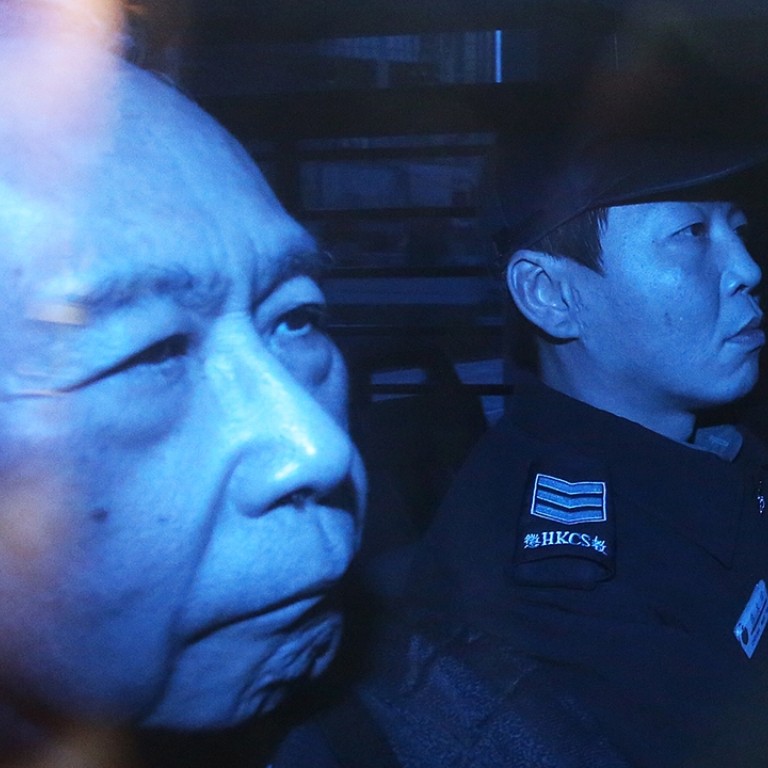
Update | Denied: Rafael Hui staying behind bars as former Hong Kong No 2 loses appeal over HK$19.7 million bribe conviction
Fellow defendant Thomas Kwok Ping-kwong, former Sun Hung Kai Properties co-chairman, to lodge final appeal with city’s top court. Hui and two others have not indicated if they will do so
All four defendants in the bribery case of former government No 2 Rafael Hui Si-yan lost their appeal against conviction on Tuesday.
Adam Kwok Kai-fai said his father, former Sun Hung Kai Properties co-chairman Thomas Kwok Ping-kwong, would lodge an appeal with the Court of Final Appeal within the 28-day period. A draft of the documents was already ready, he told reporters.
Hui and the two other defendants have not indicated whether they would lodge their final appeal with the city’s top court.
READ MORE: Hong Kong jury in Rafael Hui graft trial didn’t get right advice from judge, defence counsel alleges as appeal ends
“I am satisfied that the [trial] judge’s approach was a correct one,” appeal judge Mr Justice Wally Yeung Chun-kuen wrote in the 160-page judgment.
“Having regard to the responsibilities of Rafael Hui as chief secretary and the importance of the public objects which he served, the fact that Rafael Hui agreed to be or to remain favourably disposed to SHKP because SHKP had paid him very large sums of money was a gross departure from those responsibilities and was itself a serious misconduct in public office.”
He continued: “It will be a sad day for Hong Kong if senior public officers, such as Rafael Hui, could accept large sums of money and agreed to be favourably disposed towards their ‘paymasters’ in their public offices with impunity because the money or other advantages were paid before they assumed or after they left public office.”
In December 2014, Hui, who served as chief secretary from 2005 to 2007, was jailed for 7½ years for pocketing almost HK$19.7 million in bribes and inducements and committing misconduct in public office.
This was one of the most high-profile cases in Hong Kong’s history, involving a former No 2 official and one of the city’s most prominent tycoons. The case put into question the reputation of the government and highlighted its cosy links with the business circle.
Kwok was sentenced to five years in jail for conspiracy to commit misconduct in public office involving HK$8.5 million worth of illegal payments. His SHKP subordinate Thomas Chan Kui-yuen and another co-defendant Francis Kwan Hung-sang were serving six and five years respectively for handling HK$11.18 million in bribes.
The appeal against Chan’s sentence was allowed, but the length remains the same, at six years.
READ MORE: How exactly did Rafael Hui favour Hong Kong developer SHKP? Barristers ask in court
Earlier, much of the appeal revolved around whether it was sufficient for the defendants to be convicted of misconduct on the grounds of Hui “being or remaining favourably disposed”, without carrying out specific acts with respect to SHKP.
I am satisfied that, consonant with the concept of corruption by a payment as a ‘general sweetener’, it was not necessary for the prosecution to aver or prove that the conspirators agreed or intended that Rafael Hui would commit a specific act of serious misconduct or that he constitute serious misconduct.
In the judgment, Mr Justice Michael Lunn, vice-president of the Court of Appeal, wrote on Tuesday: “I am satisfied that, consonant with the concept of corruption by a payment as a ‘general sweetener’, it was not necessary for the prosecution to aver or prove that the conspirators agreed or intended that Rafael Hui would commit a specific act of serious misconduct or that he constitute serious misconduct.”
The prosecution has proved its case in that “[Hui] had been sweetened; his goodwill had been brought”.
“That is the abuse of the office. Thereby, he was vulnerable to corrupt demands,” Lunn wrote.
The judges agreed that part of the alleged sum was not a bribe but rebutted the defence case that the prosecutors had committed mistakes in calling it so.
The jury, they ruled, “would have understood that the use of the term ‘bribe’, by both Mr Perry and the judge, merely reflected the prosecution case that the payment was a ‘sweetener’ payment of which ... was illegal”.

“Whether or not the jury was so persuaded was a matter for them,” they added.
Thomas Kwok’s lawyers earlier contended the trial judge had not told the jury how to determine seriousness of the alleged offence and that the threshold should be a high one.
Lunn rejected the argument, saying that the jury was told that they were dealing with a former chief secretary, a director of a substantial publicly listed developer and very substantial impugned payments.


